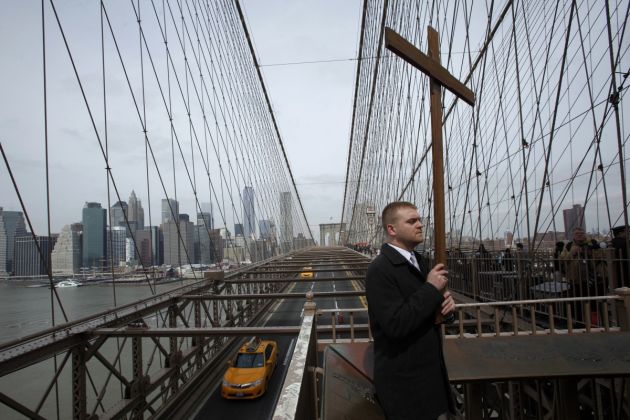Americans, even the 'unaffiliated', exaggerate church attendance, says survey

Americans still significantly exaggerate how often they attend religious services, despite a changing despite a changing religious landscape in which more people feel comfortable describing themselves as "unaffiliated," a new survey has found.
The study, entitled "I Know What You Did Last Sunday: Measuring Social Desirability Bias in Self-Reported Religious Behavior, Belief, and Belonging," was conducted by the Public Religion Research Institute and released Monday.
"Even among Americans who claim no religious affiliation, the social pressure to report at least nominal religious engagement is still quite strong," said Daniel Cox, co-author of the study and PRRI's Director of Research.
"Very few people are willing to admit that they never attend religious services, even though many of us don't."
The independent group presented the study the national meeting of the American Association of Public Opinion Research (AAPOR).
"While every subgroup of Americans measured over-reports their levels of religious participation, young adults, Catholics and white mainline Protestants are particularly likely to inflate the frequency of their attendance at religious services," the survey found
The study asked random samples of Americans identical questions about religious attendance, affiliation, salience and belief in God on two surveys – one via telephone and the other online – and compared the results.
"The existence of religious participation inflation demonstrates that church attendance remains a strong social norm in the U.S.," said Robert P. Jones, co-author of the study and CEO of PRRI.
"The impact of these norms – what social scientists call 'social desirability bias' – is that respondents talking to live interviewers on the telephone are less willing to admit lower levels of participation in an activity deemed to be socially good. Respondents completing the survey privately online are less apt to feel this pressure."
The inflation of religious participation varies considerably by religious affiliation.
Catholics and white mainline Protestants are more likely than white evangelical Protestants to over-report.
When interviewed by telephone, fewer than 3-in-10 (29 percent) white mainline Protestants report that they seldom or never attend religious services, compared to 45 percent in the self-administered online survey.
Catholics are less than half as likely to report seldom or never attending religious services when responding on the telephone versus online (15 percent vs. 33 percent).
Among white evangelical Protestants, the differences are less stark: 9 percent report they seldom or never attend religious services when speaking with a live interviewer, compared to 17 percent who report the same in a self-administered survey.
When it comes to black Protestants only 14 percent of them report seldom or never attending on a telephone survey, compared to nearly one-quarter (24 percent) on the online survey.
Surprisingly, the social desirability effects are strong among the religiously unaffiliated.
While 73 percent say they seldom or never attend religious services in a telephone survey, that number jumps nearly 20 percentage points to 91 percent on an online survey.